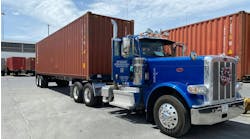Private Fleet Management Institute Head of the class
USF Logistics' Michael Naatz scores highest on fleet management exam
In spite of the fact that Michael Naatz had no formal education in transportation management prior to sitting for the PFMI (Private Fleet Management Institute) certification exam, he placed first among 69 candidates in the class of 1999. This underscores what a crucial role on-the-job experience plays in managing a private fleet.
That's not to say Naatz didn't have to study for the exam. In preparation, he spent months pouring over the materials supplied by PFMI. Four courses are offered as part of the CTP (Certified Transportation Professional) home-study curriculum, including "Understanding Private Fleet Economics"; "Designing and Implementing a Cost-Effective Fleet Operation"; "Managing and Motivating a Productive and Safe Private Fleet Work Force"; and "Vehicle Specifications and Equipment Management."
Naatz' dedicated fleet experience comes from working at USF Logistics, which is located in Long Grove, Ill. He started as the company's contract manager for its OfficeMax operation, followed by a position as logistics manager for Timken Steel, another USF client. Most recently he served as director of enterprise systems.
One of the services USF Logistics provides to clients is transportation management, including dedicated fleet operations, carrier management, and freight payment and audit services. USF operates 400-plus fleet vehicles nationwide, and in some circumstances operates dedicated fleets to complement its customers' private fleets or contract carriers.
After graduating from the University of Illinois with a B.A. in Economics, Naatz went to work for Chicago-based Westvaco as a customer service rep. In addition, he held positions in sales, warehouse management, and inventory control. And prior to joining USF Logistics, he was a distribution manager at SK Hand Tool.
Naatz' first job at USF Logistics involved running the OfficeMax Fulfillment Center's warehouse, which also included home delivery of office products. "This was really my first experience with fleet operations," he says. "In my other roles in distribution, I purchased transportation services from outside carriers, but I was never actually responsible for running the trucks."
The many hats Naatz has worn over the years have provided a strong foundation for his current job. "I've been fortunate to have been able to develop my career in a way that's allowed me to maximize my understanding of many business functions," he says.
"This knowledge puts me in a position to better understand the relationship between internal and external customers," Naatz adds.
"It's given me tremendous insight into how business decisions impact costs throughout the supply chain," he says. "My experience also makes it easy for me to relate to what other people along the supply chain are going through."
Naatz took the CTP course and exam to help him learn and grow in his job. "The training materials were very beneficial to me," he says. "Before, everything I learned was through on-the-job training and the people I worked with. Having profit-and-loss responsibility for my operations, I recognized how easy it was to lose sight of expenses," Naatz admits. "In addition, there's a multitude of government regulations that I needed to be up to speed on.
"For all of these reasons, I felt it was necessary to get a more formal background in private fleet management. At the very least, I wanted to verify that I actually knew what I thought I did."
Naatz' studies did hold some surprises for him, however. He says it was particularly interesting to compare his real-world experience with what he read in the books. "You'd be amazed at some of the things you always thought you were doing right that you actually weren't. The certification process makes you aware of the many areas where you can improve your operation."
Naatz - who tends to be modest about his accomplishments - was obviously doing a lot of things right: During both stints working with dedicated fleets he turned unprofitable operations into profitable ones, while also improving customer service.
Since the National Private Truck Council formed the PFMI as its nonprofit research and educational arm in 1991, 326 fleet/transportation professionals have earned the right to add Certified Transportation Professional (CTP) after their name. They are raising industry standards and increasing the respect and prestige of the fleet/transportation profession. It's a benchmark of excellence that's earned by a select few, but available to any fleet/transportation manager or supplier who is willing to make the necessary commitment.
To be certified, candidates must pass a two-part exam. The first part is a 31/2-hour multiple-choice exam that focuses on the core areas of fleet management. The second part is a case study in which applicants have two hours to submit a written analysis of an operational problem and develop recommendations for solving it.
The curriculum is not ivory-tower academia stuff. Rather, it is drawn from a comprehensive job analysis study conducted by the PFMI that broke down the key aspects of running a private fleet into 69 specific tasks. These have been categorized into the core areas of private fleet management addressed in the course: equipment and maintenance, safety, human resources, finance, legal and regulatory compliance, and operations.
These core areas have been reviewed by the NPTC membership to help construct a certification exam that reflects the real world. Based on the feedback of these fleet professionals, the course materials and the certification exam have been tailored to reflect how critical each task is to running a private fleet and the frequency with which each task is performed.
TOP GRADUATE: Michael J. Naatz, USF Logistics Todd Berger, UPS Truck Leasing Inc. Charles M. Bischofberger, Sony Logistics Pat A. Breaux, U.S. Postal Service Robert J. Carolan Jr., U.S. Postal Service Marianne Cleary, Boise Cascade Office Products Nola Combs, Gates Rubber Co. Dale R. Crosbie, DTF Trucking Inc. Anna Marie Deily, U.S. Postal Service Tim Dodge, EOTT Energy Corp. David Eckler, The TFE Group Al Eiden, CENEX Harvest States Cooperatives Sterling E. Farber, Puritan Bennett Medical Gases Terri P. Fleck, SUPERVALU Inc. Paul B. Hartman, Stericycle Inc. David A. Hershberger,Treasure Chest Advertising Co. Inc. Bonnie W. Iahn, Dan River Inc. John Lanty, Domino's Pizza Distribution Peter Lauerman, Ecolab Inc. Bart M. Luscuskie, T.G. Lee Foods Inc. Harry MacDonald, Clifford W. Perham Inc. Dennis Maxwell, Praxair Inc. Marshall McGaw, DTF Trucking Inc. T.J. Minichillo, U.S. Postal Service Bill W. Moore, Oberfield's Inc. Jerry L. Mote, Wilsonart International Inc. Greg Peniston, Love Transport Co. Inc. Thomas C. Pidgeon, Four H Services/Quality Bakery Products Inc. Dale A. Rowe, U.S. Postal Service Robert Schaffner, HVC Inc. Mark Schmid, N.Y. City Transit Authority Tracy Scrivens, Anchor Food Products Michael Simonetti, N.Y. City Transit Authority Donald H. Smith, Praxair Inc. Mark R. Springhetti, Kraft Pizza Division Caroline D. Stewart-Harker, Dana Global Logistics Douglas Varga, Tennessee Packaging Gary B. Webb, Bridgestone/Firestone Inc. W. Gary Welborn, WestPoint Stevens Inc. Dave Williams, Bell Atlantic Irvin M. Williams, Heckman Bindery Inc. Thomas R. Williams, Dunkin' Donuts Tommy Williams, Wilsonart International Inc. Diane D. Young, SUPERVALU Inc. Bill Young, CENEX Harvest States Cooperatives


